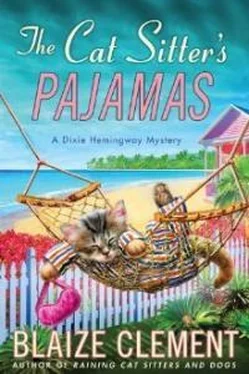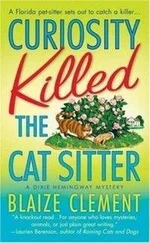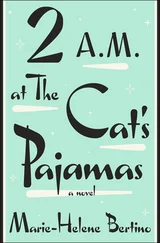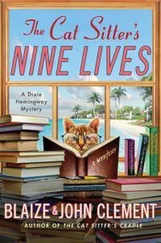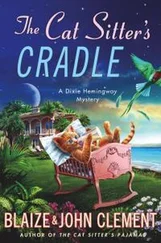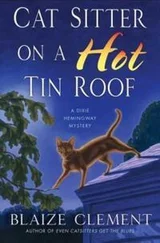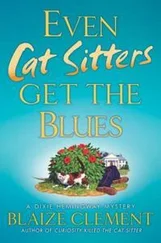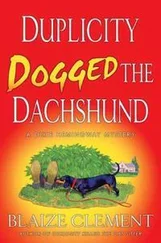Through his mask, he said, “You can’t come in here.”
“I know. I just wanted to know what you’d had to do about the tile.”
He hooked the mask with a finger and pulled it below his chin.
“Most of the fluids were in a rug, so the crime-scene techs must have got here fast and removed the body. The rug looks like an expensive Oriental, but I imagine it’s a total loss. We didn’t have to replace the tile.”
“So when can the owners come home?”
“Cupcake Trillin lives here, doesn’t he? I saw the photographs.”
I smiled. “I just take care of the cats.”
He nodded understanding. “They can come back tomorrow morning.”
He pulled his mask up and turned his machine back on, and I hustled back to the Bronco and headed home.
The sun was already below the horizon when I drove down my shelled lane, the lane that curves to the place I’ve called home since I was nine years old. Except for the years I was away making a life as a deputy and a wife and a mother … But I try not to think about those years. The memory is too sweet.
I smelled smoke from the grill when I got out of the Bronco. The western sky was flushed with coral and pink light, and the air under the trees moved with a touch of coolness.
Michael opened his kitchen door and yelled, “Heat’s almost ready!”
He meant that he had been sticking his hand over the grill to test its intensity and that he was beginning to be able to hold it still for a second or two without getting third degree burns. People who cook over open flames are masochists.
I hollered, “I’ll be down in ten minutes!”
I really would be, too. I’m the world’s fastest shower taker. Turn water on, get under it, squirt bath gel on a sponge, rub on body, stand a second, turn, stand another second, turn water off. That’s it. And I can air-dry while I dash to the office-closet for clean clothes. No wasted time rubbing with a towel, no sirree. Just jump into clean cotton, shove my feet into flip-flops, run a brush through my hair and a tube of lip gloss over my mouth, and I’m ready. Not ready for Massachusetts or New York or Idaho, maybe, but ready for Florida.
Downstairs, Michael stood with a tray of marinated meat, gazing with adoration at his hot grill. Ella Fitzgerald sat on a chaise gazing at Michael with adoration. She wore her cotton harness attached to a leash attached to the leg of the chaise. Ella has an adventurous streak, and after Paco spent hours searching the woods for her, he decreed that she would henceforth be tethered when she was outside.
The deck table was set with thick pottery plates and black-handled flatware. Salad waited in a big wooden bowl for me to toss with vinaigrette Michael had made. A chilled bottle of wine was already open, ready for me to pour into two stemmed glasses. Along with going inside and getting the scalloped potatoes from the oven, those were my jobs. Michael’s job was to stand by the grill and watch the meat so he could catch the exact moment when it was at the perfect stage of medium rare. It was our brother-sister routine perfected over many years.
Michael laid the meat on the oiled grill, and we both smiled at the sizzling sound it made. I knew Michael thought of our grandfather every time he heard that sound, same as I did. Our granddad had loved to grill as much as Michael does. He was the one who’d taught Michael to count the seconds he could hold his hand over the heat, and to slap the meat on when he could count to ten without yelping in pain.
I tossed the salad, poured wine, and scurried into the kitchen to get the pan of potatoes from the oven. Michael studied the meat, turned it once, pushed on it with a thumb to see how much it resisted. That’s another test our grandfather taught him. When he thought it pushed back about like an athlete’s thigh muscle would, he transferred it to a wooden board waiting by the grill and covered it loosely with foil.
He left it there and took his chair at the table. “We’ll let it sit awhile before I slice it.”
He always says that. For all his adult life, Michael has grilled flank steak and then said, “We’ll let it sit awhile before I slice it.” He says that because that’s what our grandfather always said, and every time he says it and we wait for the steak’s juices to settle in, we feel as if our grandfather is there with us. Maybe he is.
When Michael judged that enough time had passed, he went back to the grill and put Ella’s portion on a plate and set it on the floor—cats shouldn’t have anything with onion in it, so he hadn’t marinated it. She had already hopped to the deck floor with twitching whiskers, and attacked her chunk of beef with all the ferocity of a wild feline leaping on a small rodent in the woods. Cats love to pretend like that.
Michael picked up one of his knives that he keeps so sharp that I don’t like to even get close to them. He sliced the steak very thin and on the diagonal because it’s more tender that way. He piled several slices on our plates and moistened them with some of the marinade he’d heated on the grill. I added a scoop of scalloped potatoes from the casserole dish.
I had stopped thinking about Briana and the murder. I had stopped thinking about Guidry and Ethan. I had stopped thinking completely and simply let myself be.
Some moments are so perfect you wish you could freeze them forever. Right then, sitting under a pink-flushed sky and preparing to share a delicious meal with my big brother and Ella, was one of those moments.
13
While we ate, Michael filled me in on his last twenty-four-hour hitch. A fire had broken out in a mall restaurant kitchen during the night and threatened to spread to its neighbors. It had taken several hours to get it completely extinguished, then more time to get their equipment back on the truck. Then just as they got back to the station, another call had come in, for a residential fire. It had taken the rest of the night to get that put out and to make sure no sparks had drifted to the tinder-dry vegetation in a wooded area behind the house. Following that, there’d been a kitchen grease fire that had singed some cupboards before they got there.
Out of the blue, I said, “Michael, do you remember how Mom used to dress?”
His eyes narrowed. “I remember the times she was too drunk to get dressed.”
“I mean her sense of style. She had great taste, you have to give her that. Things like when to stop with the jewelry, or the handbag that matches the shoes. No matter how carelessly she might have seemed to choose what she wore, it was all carefully considered so nothing was done to excess and everything looked fresh and original. That takes an innate sense of style.”
“You think that makes up for everything else?”
I took a deep breath. Michael has more bitter memories of our mother than I do because he bore the brunt of her alcoholic carelessness.
“I talked to a dressmaker today who knew Mom when she was young. She said Mom was just desperate to get away from here.”
“Well, she got away.”
I could tell Michael was in no mood to talk about our mother and how she had deserted us. To tell the truth, I was surprised that I was having softer feelings toward a woman who had walked out on us when we were already reeling from the loss of our father. Of course, she had been reeling, too, from the loss of a husband.
Unlike my fashionable mother’s, my own wardrobe tended to consist of whatever was clean, comfortable, and available. I had always liked the idea that my mother would have wept if she’d known how little she had influenced me, but perhaps she had influenced me more than I realized. Who knows whether our choices are inspired by unconscious desires to emulate or to reject? I wanted to think that I was past adolescent rebellion, but it occurred to me that I might be as stuck in contrariness as my mother had been stuck in a backwater town with nobody to admire her taste in fashion except the snowy egrets and the steely-eyed herons.
Читать дальше
